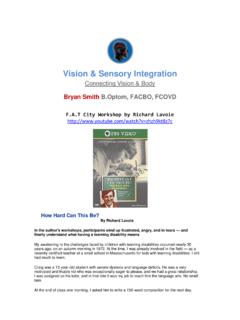Transcription of First additional language teaching in the foundation phase ...
1 Ellen LenyaiFirst additional language teaching in the foundation phase of schools in disadvantaged areas AbstractSecond language learning in South African schools is of supreme importance given the multilingual nature of the country. However, there is no certainty that teachers in the foundation phase of schools in poor environments have the skills to teach literacy in the First additional language and produce competent learners. This investigation revealed that the methods that teachers used to teach English, as the First additional language did not develop children s comprehension and communication skills.
2 It argues that if teachers do not use methods that encourage children to communicate in English the children might not acquire the competence needed to use English as the language for learning in Grade 4. Policy makers are advised to monitor the implementation of the First additional language policy and to oversee the development of an English literacy-training programme in the foundation phase that could provide teachers with the necessary skills and appropriate approaches for teaching the target : First additional language ; second language , English competency, foundation phaseEllen Lenyai, University of South Africa.
3 E-mail: African Journal of Childhood Education | 2011 1(1): 68-81 | ISSN: 2223-7674 | UJLenyai First additional language teaching in the foundation phase of schools 69 Introduction In a multilingual country like South Africa it is important that learners reach high levels of proficiency in at least two languages, and that they are able to communicate in other languages (Department of Education, 2002: 4). The new Curriculum and Assessment Policy Statement (CAPS) (DBE, 2010) for the First additional language , Grades R-3, is founded on this perspective and recommends the additive bilingual approach to the teaching of an additional language .
4 This approach assumes that children start school competent in their home language and that they can use their home language to learn an additional language . However, this statement must be read with caution and it must not influence teaching since it is concerned with assumptions and not proven facts. The CAPS is an improvement of and replaces the Revised National Curriculum Statement, Grades R-9 (NCS) of the Department of Education (2003). It states that by the end of Grade 3 children must reach a high level of communicative competence and be able to read well (DBE, 2010: 7-9).
5 The implication of these policies is that teachers must have good knowledge and skills to guide learners to develop communicative and reading skills in the First additional language , which in this case is English. However, having observed learners lack of comprehension and poor communication skills, there is no reason to substantiate that teachers have the expertise to teach English. For the purpose of this research, a competent learner is one who understands and speaks English confidently and who has the ability to use it correctly in various situations.
6 Research on the teaching of literacy in the First additional or second language at disadvantaged schools is scant while most (Brock-Utne, 2007: 509-526; Hunt, 2007: 81-83; Pretorius & Mampuru, 2007: 38-40) has focused on English as the language of Learning and teaching (LoLT). On the contrary, the emphasis in the current study was on the teaching of English literacy in the foundation phase and not on English as a question was whether teachers in the foundation phase taught English literacy to promote communication skills and to prepare children to use it as a LoLT in Grade 4.
7 The important issue for teachers therefore is to know how to teach the skills. The starting point for teachers therefore should be to know why English literacy was taught because that could influence how they teach it. It is not sufficient to know that children must be able to read and write by the end of Grade 3, the purpose or motive must also be known (Myers-Scotton, 2006: 9; Pence & Justice, 2008: 304-313; Schmitt, 2008: 292-293). If teachers knew that children must read with comprehension so that they can talk about what they have read, they would select teaching methods that would promote listening for comprehension, and verbal interaction to promote communication.
8 When English is taught to facilitate assimilation into a new culture for instance, the total immersion approach is recommended because the approach steeps children into the English language and culture. In this case the issue is literacy, implying that it is an introduction to English and attention must be on comprehension and communication skills. Functional methods such as the communicative and Total SAJCE July 201170 Physical Response (TPR) could be applied because they emphasise comprehension and communication skills.
9 If children do not comprehend, they might not be able to communicate in English. Children who cannot communicate often cannot read and write efficiently because speaking must develop before reading . They might also not be in the position to decode the language of English textbooks and experience learning challenges in Grade 4 onwards. A literature review on the teaching of the First additional language was used as conceptual framework to support the standpoint that teachers must have the skills to promote comprehension and communication skills if they are to develop children who are competent in English.
10 Literature review The point of departure here is that in order to promote communication and reading comprehension, it is necessary to know the theories, approaches and methods that explain how to teach (Haley & Austin, 2004: 44-50) and know what language inputs to make (Ellis, 1996: 142-152). The danger of a lack of knowledge in this regard could lead to teachers choice of inappropriate content and the use of unsuitable teaching approaches. The views of structural theories represented by the grammar and audio-lingual methods together with that of functional theories such as the communicative and the TPR methods gave rise to the perception and provided the basis for discussions.











